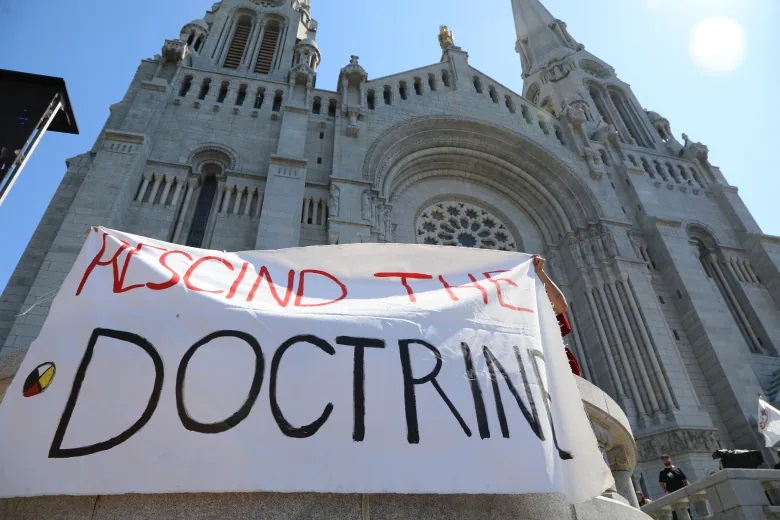QUéBEC CITY (CANADA)
CBC (Canadian Broadcasting Corporation) [Toronto, Canada]
July 28, 2022
By Ka’nhehsí:io Deer
Kenneth Deer and Louise Herne were in attendance at event at Citadelle
A delegation of Haudenosaunee is disappointed with the lack of opportunity to speak with Pope Francis during the papal visit to Quebec.
On Wednesday, Pope Francis arrived in Quebec City as a part of his six-day pilgrimage of healing, reconciliation and hope. Louise Herne and Kenneth Deer were among the diplomats and Indigenous representatives invited to the Citadelle, the fortress overlooking the Plains of Abraham and St. Lawrence River, for one of the scheduled papal events.
“The Indigenous representatives had no voice in that event,” said Kenneth Deer, who is from Kahnawake, a Kanien’kehá:ka community south of Montreal, and a member of the Haudenosaunee External Relations Committee.
The Haudenosaunee, also known as the Iroquois or Six Nations Confederacy, have been leading the call for many decades to get the papal bulls that make up the doctrine of discovery to be rescinded.
“They’re still being used today by states to to dispossess and to dis-empower Indigenous peoples,” said Deer.
The papal bulls Dum Diversas (1452), Romanus Pontifex (1455), and Inter Caetera (1493) were used by monarchs to claim Indigenous lands for themselves, and Deer said they remain ingrained in the constitutional, legislative and legal systems in Canada and the United States.
He said the papal bulls are the root cause of genocide against Indigenous peoples, including laying the grounds for Canada to establish the residential school system.
“The Vatican has to be more active in protecting and supporting the rights of Indigenous peoples,” said Deer.
The delegation was invited to the event with the expectation to be able to address Pope Francis on the issue. However, they were informed the day of the event that there would be no time for presentations.
The need to ‘keep showing up’
“We almost didn’t come but Louise here convinced us that we have to take every opportunity that we can,” said Deer.
Herne, who is a Kanien’kehá:ka Bear Clan Mother from Akwesasne, accompanied Michelle Schenandoah to the Vatican earlier this year to present a cradle board to the Pope for him to reflect upon the impact of residential schools upon families.
[VIDEO: Indigenous delegation gives Pope Francis a cradleboard symbolizing residential school survivors]
Herne said although some Haudenosaunee community members are upset that the delegation is in Quebec City for the papal visit, and want to meet with the Pope, it’s necessary for political reasons.
“We need to keep showing up. The world is run by people who show up,” she said.
“It’s a responsibility and accountability to future generations. We don’t want to repeat history.”
At the end of the event, Herne said she expressed the delegation’s disappointment to Prime Minister Justin Trudeau.
Nation-to-nation relationship
The calls for the papal bulls to be rescinded have been echoed by many leading up to the papal visit to Canada.
It was the message cousins Chelsea Brunelle and Sarain Fox had when they unfurled a “Rescind the Doctrine” banner at the Sainte-Anne-de-Beaupré Basilica where Pope Francis was holding a mass on July 28.
For the Haudenosaunee delegation, they said they will continue to campaign until “a real truth is accepted and publicly shared” by the Pope.
“We have to look at the Pope as a head of state and that we want to continue a nation-to-nation relationship with the Holy See that we would with any other state,” said Deer.
The delegation hopes they will have an opportunity to speak with the Pope before he leaves for Iqaluit on Friday.
Support is available for anyone affected by their experience at residential schools or by the latest reports.
A national Indian Residential School Crisis Line has been set up to provide support for former students and those affected. People can access emotional and crisis referral services by calling the 24-hour national crisis line: 1-866-925-4419.
Mental health counselling and crisis support is also available 24 hours a day, seven days a week through the Hope for Wellness hotline at 1-855-242-3310 or by online chat at www.hopeforwellness.ca.
Journalist

